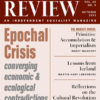Rebellious Cities
Noting the global rise in urban social movements from Occupy Wall Street to the Arab Spring that are challenging the present global order, David Harvey asks in his new book Rebel Cities: “Is there an urban alternative and, if so, from where might it come?” In answering these questions Harvey explores the critical role of the city in the reproduction of capital and birth of radical social movements. He argues that many theorists and activists interested in broad-based social change have largely overlooked cities, despite the historical and growing importance of metropolitan centers in all aspects of human affairs. | more…
Labor Divided
[Zak] Cope argues that the seemingly pervasive racism and cultural chauvinism in the global North is not the result of false consciousness, misinformation, indoctrination, or ignorance (at least to the extent that much of the political left assumes). Rather, racism and cultural chauvinism are the expression of economic interests shared by a variety of social strata in the global North, all of whom have an interest in exploiting the global South. Central to this argument is the idea that the labor aristocracy—the relatively privileged global North working class—developed as a result of the exploitation of the global South, and therefore has a material interest in continuing this exploitation. | more…

November 2013 (Volume 65, Number 6)
There is a pressing need for a coherent left strategy on climate change and in relation to the planetary environmental threat in general.… We therefore read with considerable interest Christian Parenti’s article, “A Radical Approach to the Climate Crisis” in the Summer 2013 issue of Dissent. Parenti’s main thesis is that since the time with which to address the climate change problem is so short, “it is this society and these [existing capitalist] institutions that must cut emissions. That means, in the short-term, realistic climate politics are reformist politics, even if they are conceived of as part of a longer-term anti-capitalist project of total economic re-organization.”… [Parenti] insists that capitalism has been successful in the past in addressing “specific environmental crises” and that this will also likely be the case with respect to climate change.… Perhaps the best way to explain…[why we believe Parenti’s overall argument is wrong] is to counterpose what we think would be a more appropriate statement on the nature of a revolutionary strategy. It would read as follows: Anyone who thinks that it is conceivable to counter climate change (and the planetary environmental crisis as a whole) without opposing and in part superseding the logic of capital accumulation is in denial of the very clear findings of climate science and critical social science—which point to the immediacy and unprecedented scale of the present epochal crisis and thus the need for truly revolutionary social change. | more…
Twenty-First-Century Land Grabs
Land grabs—whether initiated by multinational corporations and private investment firms emanating from the capitalist core, sovereign wealth funds in the Middle East, or state entities such as China and India—are now in the news constantly. For example, in July 2013 the Colombian ambassador to the United States resigned over his participation in a legally questionable effort to help the U.S. corporation Cargill use shell companies to amass 130,000 acres of land. This land was supposed to be used for agricultural production, but there is also land being grabbed for other purposes—such as mining or to construct roads, buildings, and dams. In human terms, land grabs mean real people and families are dispossessed. When people lose access to their land, they also lose their means to obtain food, their communities, and their cultures. | more…
Britain’s Noxious History of Imperial Warfare
In his recent widely praised Unfinished Empire: The Global Expansion of Britain, John Darwin….complains that even today there are historians of empire who “feel obliged to proclaim their moral revulsion against it, in case writing about empire might be thought to endorse it.” Apparently, he laments, there are still historians who consider it “de rigueur to insist that for them, empire was evil.” And, even more incredibly, there are some historians who “like to convey the impression that writing against empire is an act of great courage….” Darwin seems to believe that his new book is responding to some sort of anti-imperialist consensus, that the belief that the British Empire was a criminal enterprise has actually won the day and this has to be challenged. This will come as something of a surprise to most people who are under the distinct impression that the exact opposite is the case—that there is a pro-imperialist consensus very much in place. | more…
Cambodian Political History
It’s the System Stupid
On Thursday, December 13, 2012, The Guardian announced Queen Elizabeth finally received an answer to her question—”Did nobody see this coming?”—about the 2008 financial crisis.… Perhaps she could have also asked three more questions: Does nobody see the suffering and socioeconomic injustices of oligopolistic-finance capitalism? Does no one see that the problems are structural and systemic? And is there no alternative to a system that generates continuous “quadruple crises”—the socioeconomic, political, environmental, and personal/psychological?… The conventional wisdom is “There Is No Alternative,” or TINA. For this reason most Americans simply acquiesce to capitalistic social relations and, like Sisyphus, are resigned to performing eternal tasks while enduring the “endless” quadruple crises generated by a pathological system.… The most extraordinary aspect concerning the absence of an alternative is that it is fallacious. The capitalistic system itself must be transformed. To put it into a slogan: Capitalism Is No Alternative, or CINA. | more…
Zionism, Imperialism, and Socialism
Moshé Machover is a mathematician and political activist who was born in Tel Aviv in 1936 and has lived in London since 1968. He is a co-founder of the radical left Israeli Socialist Organization (ISO), which is better known by the name of its journal Matzpen (compass). The book under review is a collection of thirty-five essays written by Machover, sometimes in collaboration with other members of ISO, and dealing with the conflict between Israelis and Palestinians. The earliest essay in the collection appeared in 1966 while the most recent one was published in 2011. Perhaps the best known article is “The Class Nature of Israeli Society,” which appeared in New Left Review in 1971. Taken together, these essays provide an original and often compelling Marxist analysis of Zionism and its relationship to the Arab world. The ideas contained in this book, Machover says, are a collective product of the ISO. He is merely the carrier. | more…
Radical Internationalist Woman
Eslanda Robeson’s robust life and political actions spanned two-thirds of the twentieth century, from the Harlem Renaissance to the London theatre, from studies with students from the British empire’s colonies to travels to the rural villages of Uganda and the Congo, through anti-fascism and the Second World War, across the Cold War and African decolonization, from the Soviet and Chinese revolutions to the founding of the United Nations, from fearlessly challenging McCarthyism to attendance at the All-African Peoples Conference in Ghana, from Jim Crow to the surging of the Black Freedom Movement. Her life as an internationalist, Africanist, political radical, writer, anthropologist, journalist, acclaimed speaker and, oh, yes, did I say the wife, sometimes partner, and enduring political comrade of actor, singer, and militant activist himself, Paul Robeson, spanned virtually every continent and every struggle for equality, peace, and liberation. | more…
More Powerful Than Dynamite
The setting of Thai Jones’s wonderful book will be all too familiar to those involved in direct action politics: a liberal urban administration, a radical protest movement, disparities of wealth deepened by economic crisis. A series of incidents sets off a new phase of demonstrations, with demands from the city’s elites for a restoration of order. The radical protests become disruptive, challenging the “progressive” administration’s commitment to free speech and the right to protest. Strident radicals, bent on revolution over reform, become objects of fascination for the press, and a political tennis ball for the city’s governing class. As it happened in 1970 and 2011, so it was in 1914, New York City’s “year of anarchy” in Thai Jones’s talented telling. The parallels to the protest waves of the past, particularly the late 1960s and early ’70s, and the recent Occupy phenomenon, are obvious, and most reviewers of Jones’s fine work have highlighted these connections. Jones himself makes this history relevant to our own times, but perhaps not in the more obvious ways. | more…

October 2013 (Volume 65, Number 5)
A sign of the crass economic culture of our times is the recent release by Hasbro of the game “Monopoly Empire” based on the well-known “Monopoly” game, first mass produced in 1935 by Parker Bothers, now a Hasbro subsidiary. The new version can be played in thirty minutes and is designed to take the friction out of the game while glorifying the modern corporate system. Players collect iconic brands of corporations such as McDonalds, Coca-Cola, Nestlé, and Samsung, which they add to billboard “towers” in a race to the top. Players no longer leave the game due to bankruptcy. The goal is simply to build the biggest monopoly brand empire. | more…
The Epochal Crisis
It is an indication of the sheer enormity of the historical challenge confronting humanity in our time that the worst economic crisis since the Great Depression, sometimes now called the Second Great Depression, is overshadowed by the larger threat of planetary catastrophe, raising the question of the long-term survival of innumerable species—including our own. An urgent necessity for the world today is therefore to develop an understanding of the interconnections between the deepening impasse of the capitalist economy and the rapidly accelerating ecological threat—itself a by-product of capitalist development. | more…